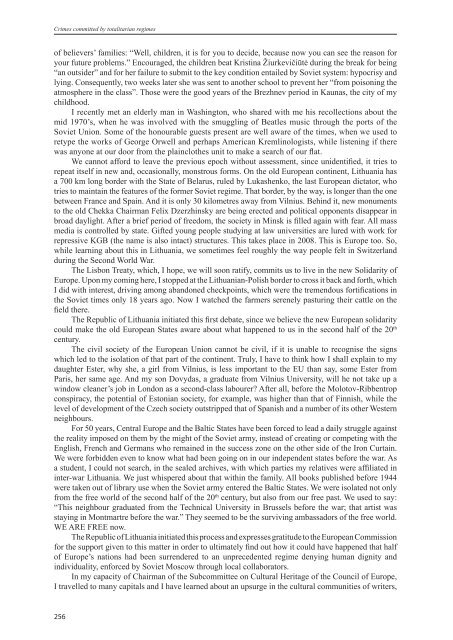crimes committed by totalitarian regimes - Ministrstvo za pravosodje
crimes committed by totalitarian regimes - Ministrstvo za pravosodje
crimes committed by totalitarian regimes - Ministrstvo za pravosodje
Create successful ePaper yourself
Turn your PDF publications into a flip-book with our unique Google optimized e-Paper software.
Crimes <strong>committed</strong> <strong>by</strong> <strong>totalitarian</strong> <strong>regimes</strong><br />
of believers’ families: “Well, children, it is for you to decide, because now you can see the reason for<br />
your future problems.” Encouraged, the children beat Kristina Žiurkevičiūtė during the break for being<br />
“an outsider” and for her failure to submit to the key condition entailed <strong>by</strong> Soviet system: hypocrisy and<br />
lying. Consequently, two weeks later she was sent to another school to prevent her “from poisoning the<br />
atmosphere in the class”. Those were the good years of the Brezhnev period in Kaunas, the city of my<br />
childhood.<br />
I recently met an elderly man in Washington, who shared with me his recollections about the<br />
mid 1970’s, when he was involved with the smuggling of Beatles music through the ports of the<br />
Soviet Union. Some of the honourable guests present are well aware of the times, when we used to<br />
retype the works of George Orwell and perhaps American Kremlinologists, while listening if there<br />
was anyone at our door from the plainclothes unit to make a search of our flat.<br />
We cannot afford to leave the previous epoch without assessment, since unidentified, it tries to<br />
repeat itself in new and, occasionally, monstrous forms. On the old European continent, Lithuania has<br />
a 700 km long border with the State of Belarus, ruled <strong>by</strong> Lukashenko, the last European dictator, who<br />
tries to maintain the features of the former Soviet regime. That border, <strong>by</strong> the way, is longer than the one<br />
between France and Spain. And it is only 30 kilometres away from Vilnius. Behind it, new monuments<br />
to the old Chekka Chairman Felix Dzerzhinsky are being erected and political opponents disappear in<br />
broad daylight. After a brief period of freedom, the society in Minsk is filled again with fear. All mass<br />
media is controlled <strong>by</strong> state. Gifted young people studying at law universities are lured with work for<br />
repressive KGB (the name is also intact) structures. This takes place in 2008. This is Europe too. So,<br />
while learning about this in Lithuania, we sometimes feel roughly the way people felt in Switzerland<br />
during the Second World War.<br />
The Lisbon Treaty, which, I hope, we will soon ratify, commits us to live in the new Solidarity of<br />
Europe. Upon my coming here, I stopped at the Lithuanian-Polish border to cross it back and forth, which<br />
I did with interest, driving among abandoned checkpoints, which were the tremendous fortifications in<br />
the Soviet times only 18 years ago. Now I watched the farmers serenely pasturing their cattle on the<br />
field there.<br />
The Republic of Lithuania initiated this first debate, since we believe the new European solidarity<br />
could make the old European States aware about what happened to us in the second half of the 20 th<br />
century.<br />
The civil society of the European Union cannot be civil, if it is unable to recognise the signs<br />
which led to the isolation of that part of the continent. Truly, I have to think how I shall explain to my<br />
daughter Ester, why she, a girl from Vilnius, is less important to the EU than say, some Ester from<br />
Paris, her same age. And my son Dovydas, a graduate from Vilnius University, will he not take up a<br />
window cleaner’s job in London as a second-class labourer? After all, before the Molotov-Ribbentrop<br />
conspiracy, the potential of Estonian society, for example, was higher than that of Finnish, while the<br />
level of development of the Czech society outstripped that of Spanish and a number of its other Western<br />
neighbours.<br />
For 50 years, Central Europe and the Baltic States have been forced to lead a daily struggle against<br />
the reality imposed on them <strong>by</strong> the might of the Soviet army, instead of creating or competing with the<br />
English, French and Germans who remained in the success zone on the other side of the Iron Curtain.<br />
We were forbidden even to know what had been going on in our independent states before the war. As<br />
a student, I could not search, in the sealed archives, with which parties my relatives were affiliated in<br />
inter-war Lithuania. We just whispered about that within the family. All books published before 1944<br />
were taken out of library use when the Soviet army entered the Baltic States. We were isolated not only<br />
from the free world of the second half of the 20 th century, but also from our free past. We used to say:<br />
“This neighbour graduated from the Technical University in Brussels before the war; that artist was<br />
staying in Montmartre before the war.” They seemed to be the surviving ambassadors of the free world.<br />
WE ARE FREE now.<br />
The Republic of Lithuania initiated this process and expresses gratitude to the European Commission<br />
for the support given to this matter in order to ultimately find out how it could have happened that half<br />
of Europe’s nations had been surrendered to an unprecedented regime denying human dignity and<br />
individuality, enforced <strong>by</strong> Soviet Moscow through local collaborators.<br />
In my capacity of Chairman of the Subcommittee on Cultural Heritage of the Council of Europe,<br />
I travelled to many capitals and I have learned about an upsurge in the cultural communities of writers,<br />
256




